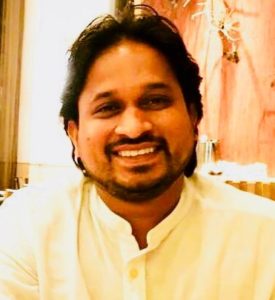
Sanjeev Kumar (Ph.D, University of Delhi, 2019) specializes in Indian Political Thought, Ambedkar, Religious Studies and Caste and Identity Politics. Working at the juncture of Indian thought and specialized on Ambedkar, much of his work revolves around caste, religion, social justice and ethics using interdisciplinary perspective. He is particularly interested in exploring the contemporaniety of ideas and discourses pertaining to the ethical questions as well as simultaneity of science, religion, and history in the 19th and 20th century India. He has edited a book on ‘Introduction to the Comparative Government and Politics’ in 2017. He has also written several articles and has contributed chapters in books. One of his recent writings is ‘Ambedkar’s Journey of Conversion to Buddhism’ published from CVD, Sage publication in 2019. His forthcoming works pertain to ‘Two Concepts of Conversion: Ambedkar, Social Isolation and Self-Respect’, Oxford University Press, and another book ‘On Ethics and Politics: Exploring Ambedkar’s Methodological Inheritances’. His other research interest/project pertains to the study of ‘Democracy from Below.’ In this direction, he has founded a research organization International Elections Studies Association of India’ in 2016 (www.iesai.in).
Sanjeev is currently undertaking following projects:
- History, Science and Religion among Modern Indian Intellectuals: A Thematic and Methodological Exploration” (2020-2022)
Abstract: For decades, scholarship on the relationship between science and religion has maintained that there exists ‘conflict’ among these phenomena. Such scholarship is ‘positivist’ in character, and views Western Enlightenment and Oriental Renaissance as the victory of science over religion. However, contemporary works have denounced such epistemological claims by emphasizing on Positivism and demonstrated ‘complexity’ in their relationship. In this backdrop, this study explores modern Indian thinkers such as Vivekananda, Aurobindo, Savarkar, Ambedkar, Phule, Sir Syed Ahmad, and Madanmohan Malvia to demonstrate how religion, science and history were not opposed, distinct or antithetical rather they were complimentary to each other.
- On History and Politics: Advaita-Vedanta and the Idea of Self in Colonial India” (2019-2021).
Abstract: Ideas in Indian political thought has been mostly studied through the binaries such as secular/religious, liberal/Marxist, traditionalist/modernist, and self/other etc., that has produced linearity and teleological understandings as well as ideological loaded knowledge formations. In this backdrop this study attempts to explore the centrality of Advaita-Vedanta tradition in the conceptualization of self in the modern Indian thinkers. This study is sponsored by Indian Council for Historical Research (ICHR), India.
- Rights, Status and lifeworld of Marginalized Communities in India: A Study of Jammu and Kashmir since Independence” (2019-2021).
Abstract: This study attempts to explore the policies, and narratives of SCs, STs and OBCs regarding their livelihood, rights and forms of exclusion and inclusion in three regions of the state i.e. Jammu, Kashmir and Laddakh since independence. This project is sponsored by Indian Council of Social Science Research (ICSSR), India.
- On Ethics and Politics: Exploring the Methodological Inheritances of Ambedkar” (2020-22).
Ambedkar in order to reflect on caste, religion and the questions of ethics and morality, he frequently referred scholars such as John Dewey and Tufts as well as his contemporary intellectuals such as Edwin R. A. Seligman, James Harvey, and Alexander Goldenweiser, Renan etc. Moreover, his deeper engagement with Buddhism made him to innovate various methodological tools which have not yet been adequately explored. This study seeks to map the horizon of Ambedkar’s methodological inheritances in conceptualizing the question of ethics and morality in the colonial times.
